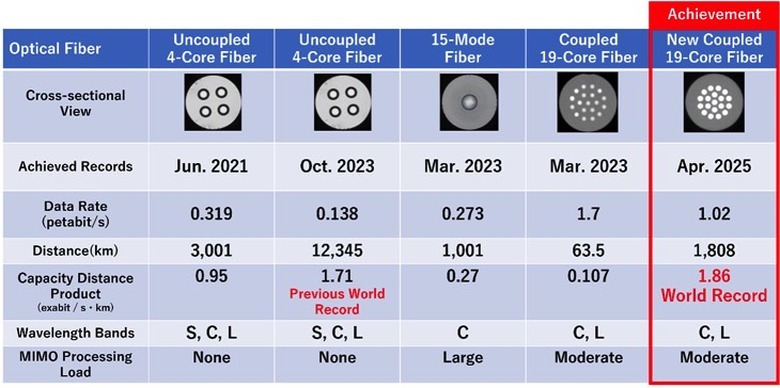Download All Of Netflix In 1 Second? Record-Breaking New Data Connection Can Actually Do It
We may receive a commission on purchases made from links.
Netflix lets you download TV shows and movies to play while you're offline, but there are limits in place (100 active downloads per device). The app only lets you grab a specific number of episodes or movies, and they expire after a while. Also, the smartphone, tablet, or laptop you're using comes with limited storage. Even without Netflix's limits, you can't use the entire disk capacity for movie downloads.
But say you or a friend of yours wants to download the entire Netflix catalog, and storage isn't an issue. How long would that take? A crazy new innovation in internet data speed transfers out of Japan gives us a mind-bending answer: 1 second. That's how long it would take to download all of Netflix over the new record-breaking connection, which reacheed 1.02 petabits per second over nearly 2,000km (over 1,100 miles) of optic fiber.
According to IFLScience, Netflix had about 18,000 titles as of mid-December 2023. Assuming a title needs 7GB of storage, you'd need 123TB of data for the entire Netflix catalog.
Record-breaking internet data transfer speed
An international team led by the Photonic Network Laboratory at the National Institute of Information and Communications Technology (NICT) in Japan created an optic fiber cable that contains 19 separate strands of fiber. Used together, the 19-core system allowed them to transfer data at 1.02 petabits per second. Turn the bits into bytes, and you get a transfer speed of around 125TB/s.
That's enough to download the entire Netflix catalog in a second, assuming you had that much storage space at your disposal and that Netflix would actually let you download everything. On that note, it would take you a lot longer than 1 second to manually download all those titles, assuming no type of automation was involved.
Of course, once you initiate a hypothetical download over this new type of fiber optic cable, you'd have it immediately on your device, ready to play.
Why is it important?
Moving data at 1.02 petabits/s isn't even the best data transfer speed for 19-core optic fiber cables. The researchers managed to hit 1.7 petabits/s in early 2023. The big difference here concerns the distance the data traveled in those experiments.
The March 2023 test allowed them to move data at 1.7 petabits/s over 63.5 km (39.45 miles). The April 2025 experiment is far more ambitious. The researchers were able to transmit data at 1.02 petabits/s over a distance of 1,808 km (1,123 miles). That's roughly equivalent to the distance from Sapporo to Fukuoka, from Missouri to Montana, or from Berlin to Naples.
The breakthrough is remarkable, as it could speed up data transfers significantly in the future between continents or larger cities. You'll almost certainly not get a 1-petabit/s internet connection at home. But the ability to move data at incredible speed over large distances is the key development here.
We live in a world where we produce significant amounts of data, with AI generating lots of data along the way. AI firms require access to lots of data for training new frontier models.
According to April 2025 stats gathered by ExplodingTopics, nearly 403TB of data is created each day. You'd need three seconds to download it all via the latest NICT internet data speed experiment.
Fast 5G networks allow us to move more data while we're on the go, both for work and pleasure. Back to Netflix downloads, it's a lot easier to download titles over a 5G connection or a matching Wi-Fi home network. In turn, streaming companies like Netflix could benefit from technology like the 19-core optical fiber cable from NICT to move data faster than ever between its worldwide servers.
That said, there's no telling when this technology will be deployed commercially or how much it'll cost. Given NICT's progress seen in the table above, it's likely the researchers will continue to improve the technology to the point where some countries or internet companies will want to use it.
The real-world top internet download speeds available currently sit at around 400 Gigabit/s or around 50GB/s.

